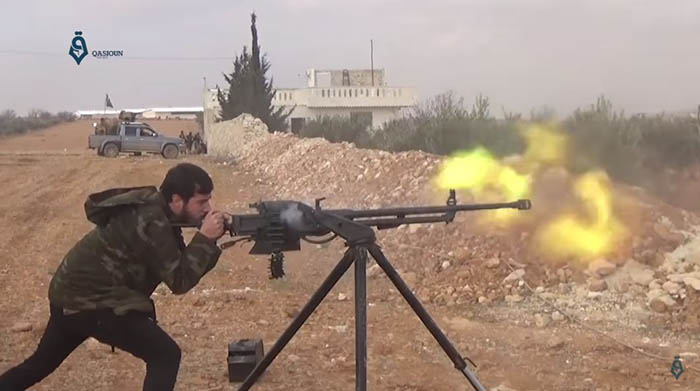[vc_row][vc_column][vc_column_text]

Turkish-backed fighters in combat during the Battle of al-Bab. Credit: Qasioun News Agency
In March, the Violation Documentation Center reported on the arrest of two journalists in Jarabulus by the local Turkish-backed security intelligence. They noted that the Turkish zone of influence has a high level of insecurity for journalists and are “closed to the media except for those licensed by Turkey, and closed to local and international human rights organisations”.
“Journalists and activists in these areas are also subjected to restrictions and abuses that amount to killing, kidnapping and torture,” they continued.
After years of bitter fighting, northern Syria has been divided between two main factions: Hayat Tahrir Al-Sham, a former Al Qaeda-affiliated group based in the northwest, and Turkish backed rebel groups, in northeastern Syria. Both sides attempt to control the flow of news out of the regions by limiting access to certain areas, making threats or, in some cases, kidnapping journalists.
A photographer who works primarily in the northeast and requested anonymity told Index on Censorship that the de facto Turkish-backed rebel authorities harass journalists who are critical to the forces in control of the Euphrates shield area.
After filming in Afrin, the photographer said he had been tortured by Al-Hamzat, which runs the drug trade in the area, as well as being engaged in smuggling between Turkey and Syria.
“I was kidnapped in front of my house, pushed into a van, struck on the head and woke up handcuffed in a cell,” the activist said. He was unable to see out of one eye.
Because he was a journalist working for a foreign media outlet, the rebels interrogated him with the same brutal techniques that Bashar al-Assad regime’s intelligence service had used — something which he had experienced previously in 2012. “They threatened to murder me and my family,” he said.
During his detention, which lasted five weeks, he said that more journalists and other individuals were brought into the jail. “I could hear the voices of people being tortured, and the moaning of the prisoners,” he said.
The photographer said he was released without charge. Yet it took him two weeks to recover from the abuse he had suffered while in detention. “They told me before they let me go ‘I will break your camera’ if they see me filming again.”
Despite the treatment he received, he said that the detention had made him more determined to go to his back to his work. “Assad’s regime didn’t stop journalists — neither will the new regime,” he said.
Another journalist who requested anonymity, who moved from southern Syria to al-Bab with his family in April 2018 after being displaced, told Index on Censorship that: “Since I arrived here, life has been tough and risky.” Journalists often face trouble in the city, whether from militants or security services, who — like the local authorities — dislike critical coverage towards them or their funders.
In early February 2019, when large protests erupted in the city against the endemic corruption of the Turkish-backed authorities, journalists covering the demonstrations came under direct threat. The freelance journalist said that he had survived an assassination attempt after being threatened for his reporting of the movement.
He explained that when the anti-corruption protests broke out, “I wanted to do interviews for a news agency I work with. However, when I raised questions about Turkey’s negative impact on al-Bab with the protesters, some refused to talk, fearing persecution if they were caught talking badly about Turkey”.
As the protest was breaking up, “I was approached by an unknown person who told me ‘watch what you are doing or they’ll make you disappear’”.
The journalist said the warning made him leave the area and remove any photo credits and bylines from everything about the protests.[/vc_column_text][/vc_column][/vc_row][vc_row][vc_column][vc_basic_grid post_type=”post” max_items=”4″ element_width=”6″ grid_id=”vc_gid:1556014705543-35c8d396-d90b-8″ taxonomies=”213″][/vc_column][/vc_row]




